The Unified Communications and Collaboration Market is estimated to be valued at USD 106.9 billion in 2025 and is projected to reach USD 324.9 billion by 2035, registering a compound annual growth rate (CAGR) of 11.8% over the forecast period.
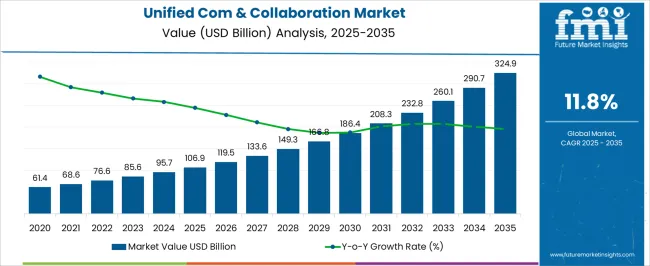
| Metric | Value |
|---|---|
| Unified Communications and Collaboration Market Estimated Value in (2025 E) | USD 106.9 billion |
| Unified Communications and Collaboration Market Forecast Value in (2035 F) | USD 324.9 billion |
| Forecast CAGR (2025 to 2035) | 11.8% |
The unified communications and collaboration (UCC) market is advancing rapidly, driven by the growing need for seamless communication tools, remote working models, and enterprise digitalization initiatives. Industry publications and corporate disclosures have emphasized that enterprises are investing heavily in cloud-based collaboration platforms to improve workforce productivity and reduce operational complexities. The increasing integration of voice, video, messaging, and conferencing into unified platforms has streamlined workflows and reduced reliance on disparate tools.
Additionally, advancements in AI-driven analytics, real-time transcription, and security enhancements have strengthened the appeal of UCC solutions across industries. Public sector digitization initiatives and enterprise modernization strategies have further expanded adoption.
Future growth is anticipated through deeper integration of UCC with enterprise resource planning and customer relationship management systems, along with the expansion of edge computing and 5G infrastructure. Segmental momentum is expected to be anchored by Types within the component category, Public Cloud in deployment, and Large Enterprises as the leading adopters, reflecting both scale-driven demand and digital transformation priorities.
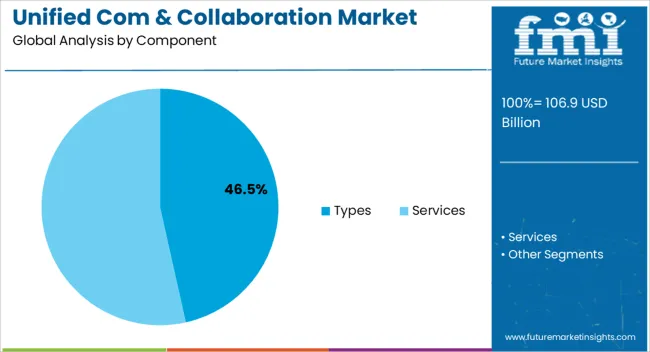
The Types segment is projected to contribute 46.50% of the unified communications and collaboration market revenue in 2025, maintaining its role as the leading component. This dominance has been driven by the demand for integrated voice, video, messaging, and conferencing solutions that consolidate communication functions into a single platform.
Enterprises have increasingly valued the efficiency gains from unified types, which reduce the complexity of managing multiple vendors and systems. Technology advancements have enabled these platforms to offer scalability, interoperability, and strong security features, making them suitable across industries.
Corporate disclosures and IT investment strategies have emphasized the cost savings and productivity enhancements achieved through integrated types, sustaining the segment’s leadership.
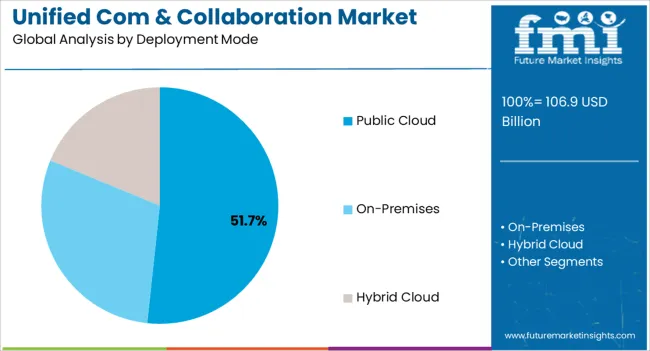
The Public Cloud segment is anticipated to account for 51.70% of the unified communications and collaboration market revenue in 2025, leading adoption across deployment modes. Growth in this segment has been attributed to the scalability, flexibility, and cost-efficiency of public cloud solutions, which allow enterprises to rapidly deploy collaboration tools without heavy upfront investments.
Cloud service providers have expanded offerings with enhanced security, compliance, and AI-enabled features, improving adoption in both regulated and non-regulated sectors.
Press releases from leading vendors have highlighted rapid uptake of public cloud UCC platforms as enterprises pursue hybrid and remote working models. With continuous innovation and reduced barriers to entry, the Public Cloud segment is positioned to retain its dominance in the coming years.
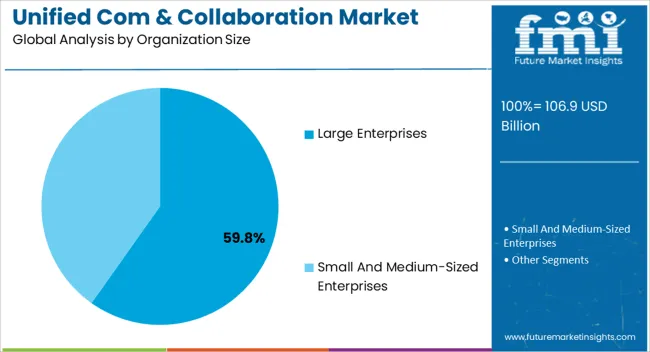
The Large Enterprises segment is expected to capture 59.80% of the unified communications and collaboration market revenue in 2025, affirming its position as the leading organizational category. This growth has been influenced by the substantial investments large enterprises are making to modernize IT infrastructure and improve collaboration across geographically dispersed teams.
Industry analyses and annual reports have highlighted that large enterprises face complex communication needs, requiring advanced UCC platforms with integration capabilities for ERP, CRM, and other business-critical systems.
Additionally, large organizations have the budgetary capacity to implement advanced security features, compliance tools, and AI-driven analytics, which are essential for global operations. As digital transformation agendas continue to accelerate, the Large Enterprises segment is expected to sustain its leadership in UCC adoption.
As per the unified communications and collaboration market research by Future Market Insights - a market research and competitive intelligence provider, historically, from 2020 to 2025, the market value increased at around 15.7% CAGR.
Unified Communications (UC) systems have been used by businesses to decrease operational costs, improve revenues, and build customer connections. By combining diverse communication technologies into a single platform, UC enhances decision-making.
As an outcome, unified communications systems are frequently used to promote cross-functional collaboration and achieve favorable results.
RingCentral, Inc., a leading supplier of global business cloud communication, collaborations, and contact center solutions, has established a significant relationship with Avaya Holdings Corp., a global pioneer in solutions to increase and simplify communication systems and collaborative efforts.
Avaya will offer Avaya Cloud Office with RingCentral, a worldwide unified communication as a services (UCaaS) solution, as part of this exclusive alliance.
The most recent innovations, like Artificial Intelligence (AI), are crucial in aiding associations in accomplishing their computerized change objectives.
Simulated intelligence-empowered arrangements can help associations make easy records, follow speakers, naturally record calls, and grasp clients' requirements. Artificial intelligence-empowered UCaaS arrangements can likewise help in opinion examination.
The adoption of cloud-based communication solutions enabling quick and smooth communication across businesses is likely to boost market development. Businesses are using cloud-based collaboration solutions through several time zones to boost the effectiveness of their mobile team members.
The telecommunications industry will observe an uptick in revenue due to its collaboration with UCC, a single network infrastructure that supports unified communications management.
Comcast recently finalized the acquisition of Blueface, a provider of unified communication services. Blueface's patented and completely customized cloud voice unified communications technology will be added to Comcast Company's portfolio of business-grade products, allowing enterprises to interact and collaborate more easily.
Customers will have access to video and audio capabilities to communicate with employees throughout devices and locations since Blueface's Unified Communications (UC) service is added here to the Comcast Business portfolio.
In 2025, the on-premise segment led the unified communications industry, accounting for over half of worldwide sales. However, due to the complexity of deploying and administering contemporary full-stack UC platforms, the demand for the new on-premise unified communication network and licenses is likely to continue to fall during the term.
Firewall and session border control systems must be configured to allow remote users access. As a result, demand for on-premise UC systems is likely to fall throughout the projection period.
Zoom recently announced the addition of a new Referral Partner Program and relationships with businesses like Master Agent AVANT Communication, Intelisys, Pax8, and Telarus to its Worldwide Channel Partner Program.
Zoom's video-first unified communication platform's go-to-market strategy will include the new Partner Referral Program. It builds successful relationships by training, enabling, and inspiring partners to develop, advertise, and sell Zoom-based solutions.
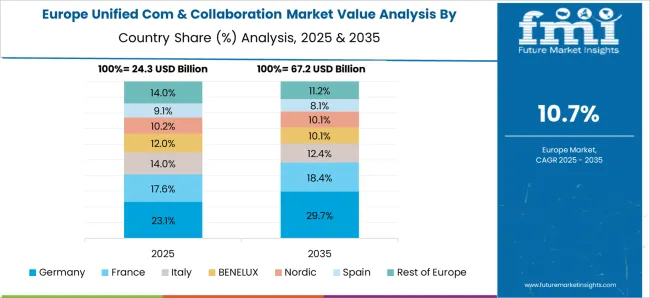
In 2024, Europe dominated the unified communications industry, accounting for over half of all sales. The growing demand for UC in the region has allowed many providers to establish themselves.
The Yamaha ADECIA solutions, a full and smart microphone and a lines array audio system intended to reduce all hurdles for outfitting conference rooms and schools with better audio quality, received a favorable review from Wainhouse Research.
The ADECIA product line solves installed audio issues by expediting installation and configuration once at a time when human capital is in limited supply throughout North America and Europe, thus lowering installation costs and production schedules.
Over the projection period, the market in the Asia Pacific is projected to account for the largest CAGR. The expansion can be ascribed to an increased focus on collaboration and cost-cutting strategies in the region to guarantee greater resource use.
Banking and financial services, BPO, government, telecommunications, logistics, and hospitality have all resorted to unified communications to provide more effective services.
By the end of 2035, the United States is predicted to account for the largest market share of USD 83 Billion.
Given that the United States was one of the countries most hit by COVID-19, government agencies, healthcare professionals, and physical and online distribution networks in the United States are counting on effective communication and teamwork to provide sufficient care and diagnosis. In the United States, this has been pushing the application of UCaaS.
360networks is a significant wholesale distributor of communications equipment and services within the western United States. Their entire variety of voice-leased line circuits, including data services, is built on a unified network infrastructure that the firm owns and operates, allowing them to deliver dependable, rapid client support directly from the source.
The fiber-optic backbone was designed from the bottom up to provide constant performance throughout 17,200 route miles.
The large enterprise segment is forecasted to grow at the highest CAGR of over 11.7% from 2025 to 2035. Tech-savvy employees demand more communication at work to promote efficiency and production. Furthermore, the sector is driven by the growing number of millennials in the workplace and the necessity for multi-channel communication.
Large organizations are continually updating their communication infrastructure to attract the finest employees. As a result of the new generation of employees, the demand for UC is projected to increase in the coming years.
BlueJeans Network, a recognized enterprise-grade video conferencing and events platform, was acquired by Verizon Business in a formal agreement. With this purchase, Verizon's virtual unified communications portfolio has expanded. BlueJeans' easy, smart, and trustworthy meeting platform will be combined with Verizon's unified communication as a services provider.
On Verizon's high-performance international networks, customers can benefit from a BlueJeans company video experience. Additionally, the platform will be tightly integrated into Verizon's 5G product pipeline, allowing for secured and actual engagement solutions in high-growth sectors, including medical, remote learning, and field service operations.
The BFSI segment is forecasted to grow at the highest CAGR of over 12% from 2025 to 2035. Within the financial services industry, unified communications and collaboration are at the edge of facilitating transformation.
Digital transformation thrives with UC&C, whether in dispersed financial services delivery, developing new channels and forms of interaction, agile operations, or fulfilling new regulatory criteria. Financial services businesses with better insight and control over their UC&C landscape are becoming masters of change.
The Reserve Bank of India has sent off UPI123Pay, a solution that will permit clients to make UPI payments utilizing their cell phones and incorporate them into the electronic payment environment. The UPI 123 services will be available to the country's expected 450 million functional mobile users, primarily utilizing 2G networks.
UPI-123Pay seeks to provide the UPI stack's online payment value to feature handsets. Users were required to call a feature phone and pay up to a predetermined number to access banking transactions without using the internet by using UPI payment through the use of pre-defined IVR numbers.
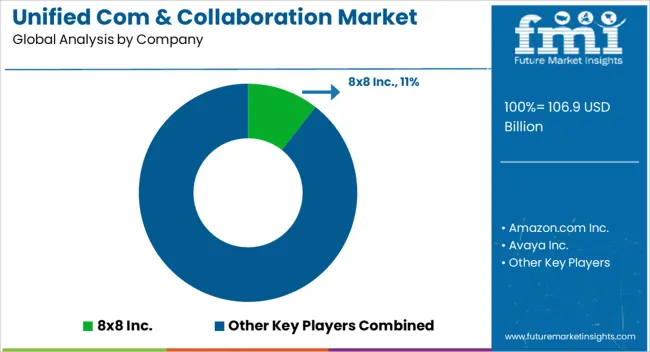
The leading players in the global Unified Communications and Collaboration market are Zoom Video Services, BlueJeans Network, Verizon, BT Group, Cisco Systems Inc., Genesys (Permira), Google LLC, Huawei Technologies Co., Ltd., Microsoft Corporation, Mitel Networks Corporation, NEC Corporation.
The global unified communications and collaboration market is estimated to be valued at USD 106.9 billion in 2025.
The market size for the unified communications and collaboration market is projected to reach USD 324.9 billion by 2035.
The unified communications and collaboration market is expected to grow at a 11.8% CAGR between 2025 and 2035.
The key product types in unified communications and collaboration market are types and services.
In terms of deployment mode, public cloud segment to command 51.7% share in the unified communications and collaboration market in 2025.






Full Research Suite comprises of:
Market outlook & trends analysis
Interviews & case studies
Strategic recommendations
Vendor profiles & capabilities analysis
5-year forecasts
8 regions and 60+ country-level data splits
Market segment data splits
12 months of continuous data updates
DELIVERED AS:
PDF EXCEL ONLINE
Mobile Unified Communications and Collaboration (UC&C) Solution Market Size and Share Forecast Outlook 2025 to 2035
Unified Endpoint Management Market Size and Share Forecast Outlook 2025 to 2035
Unified Network Management Market Size and Share Forecast Outlook 2025 to 2035
Unified Communication as a Service (UCaaS) Market by Solution, Enterprise Size, Vertical & Region Forecast till 2035
Communications Platform as a Service (CPaaS) Market in Korea Growth – Trends & Forecast 2025 to 2035
Telecommunications Services Market - Growth & Forecast 2025 to 2035
Japan Communications Platform as a Service Market Growth - Trends & Forecast 2025 to 2035
Customer Communications Management Market Size and Share Forecast Outlook 2025 to 2035
Oilfield Communications Market Size and Share Forecast Outlook 2025 to 2035
Tactical Communications Market Size and Share Forecast Outlook 2025 to 2035
Military Communications Market Analysis by Component, Application, End User & Region from 2025 to 2035
Communications Platform as a Service (CPaaS) Market Growth - Trends & Forecast 2025 to 2035
LTE & 5G for Critical Communications Market Size and Share Forecast Outlook 2025 to 2035
High Frequency Military Communications Market Size and Share Forecast Outlook 2025 to 2035
Semiconductors for Wireless Communications Market
Collaboration Tools Market Size and Share Forecast Outlook 2025 to 2035
Collaboration Display Market Size and Share Forecast Outlook 2025 to 2035
Design Collaboration Software Market Size and Share Forecast Outlook 2025 to 2035
Cloud Based Collaboration Software Market Size and Share Forecast Outlook 2025 to 2035
R & D Cloud Collaboration Market Size and Share Forecast Outlook 2025 to 2035

Thank you!
You will receive an email from our Business Development Manager. Please be sure to check your SPAM/JUNK folder too.
Chat With
MaRIA